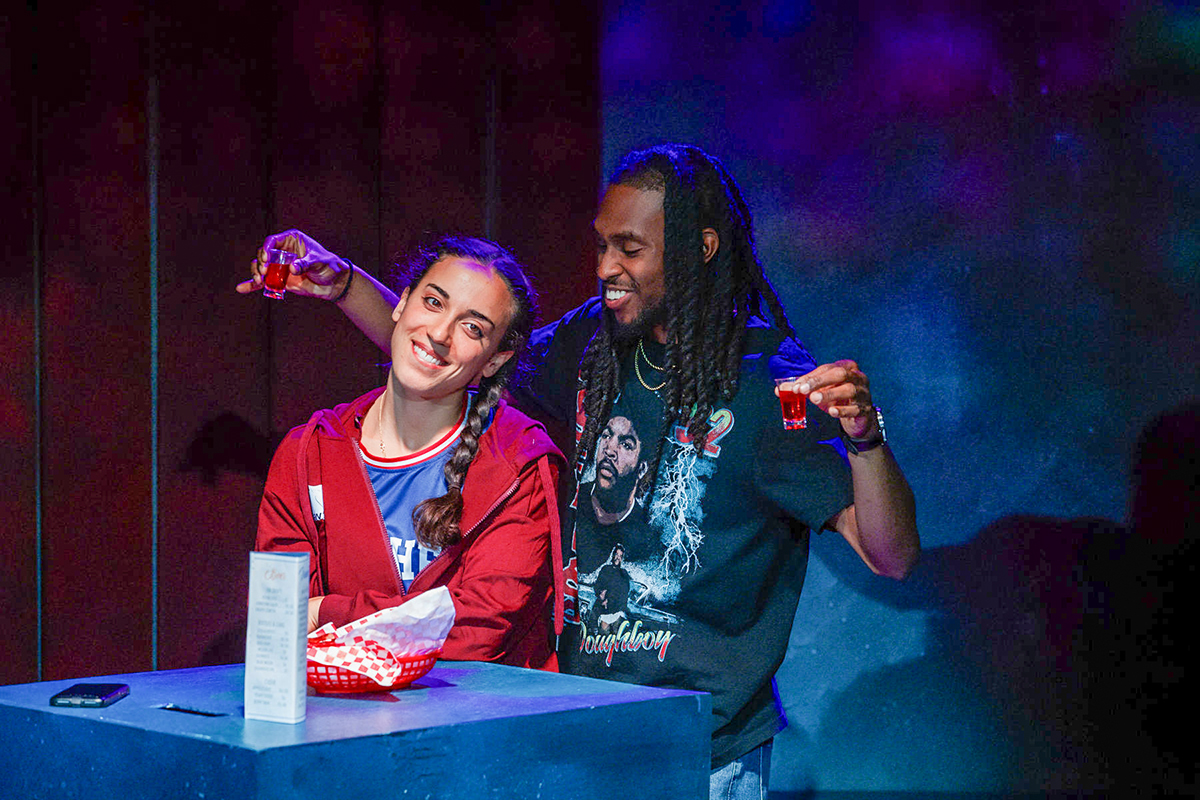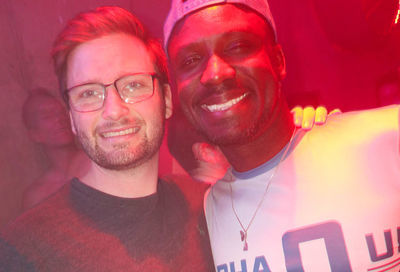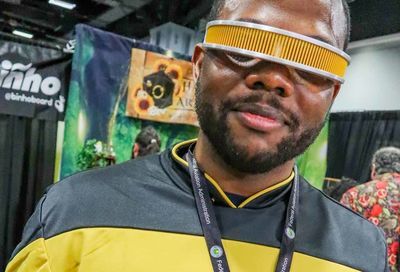DC Theater Review: ‘This Bitter Earth’ at Theater Alliance
Built around a pair of potent performances, This Bitter Earth explores an interracial gay couple's love and conflict

A stage vast enough to contain multitudes is virtually shrunk down to the intimate size of a shared bed, and a shared life, in Otis Ramsey-Zöe’s well-crafted production of This Bitter Earth (★★★★☆). The romantic drama, by GLAAD Media Award-winning playwright Harrison David Rivers, charts the progress of writer Jesse and activist Neil from strangers who meet at a protest rally, to lovers who fit together despite their deep-rooted differences.
Jesse (Justin Weaks) is black and Neil (Noah Schaefer) is white, but their predominant contrasts are in temperament and in their tactics for processing the injustices they see in the world. For a major twist in their relationship, and in the play, is that Neil is heavily involved in the Black Lives Matter movement, while Jesse directs revolutionary energies towards his writing.
A racial reversal that easily could come off as gimmicky instead reads as sincere from both sides. Rivers’ clever script pokes fun at Neil’s supposed white guilt, and Jesse’s apparent apathy, but represents neither as mere stereotype. Although, occasionally, the play does cast Jesse as a witty spokesperson for a type of opinionated, educated black gay man. The prickly writer describes his work as a meditation on blackness and queerness, and he makes a persuasive argument that ending racism in America isn’t about him marching with BLM, it’s about white people changing how they deal with racism.
Neil professes that his relationship with Jesse does change how he thinks of race, and how he experiences it in the world. The assured direction and Schaefer’s engaging performance ensure that we believe Neil is earnest in his activism. Schaefer renders Neil’s impressive capacity for empathy as not a pose, but a steadfast conviction that he can learn from Jesse, and from the pain and anger triggered by events like the shooting deaths of Trayvon Martin and Michael Brown. Jesse, in turn, learns to embrace every emotion that comes with loving himself and loving his partner. When Jesse sincerely counts his blessings, Weaks finds the joy, gratitude, and fear underlying the act.
The couple’s happiness together isn’t promised, but the audience will join them in hoping for it, as Jesse and Neil’s romance proceeds in elegantly nonlinear fashion. Scenes are shuffled and repeated, and dealt out of order — yet continually add up to a winning hand. Abetted by John D. Alexander’s extraordinarily nimble lighting, Weaks and Schaefer jump chronologically across months and years, capturing the rhythm of how a new couple flirts, or how long-time partners fight, or how drunk partners can flirt and fight simultaneously. The dynamic duo creates a warm, physical intimacy that envelops the house, and aids the audience in keeping track of the story’s rapid changes in time and location.
The direction also demands that the actors physically envelop the audience, entering and exiting Brian Gillick’s set of painted platforms from all four corners of the house. They might bicker or tease each other across a chasm of space. They might team up centerstage for duets of boyfriend drama, or cede the stage to their partner for one of several powerful monologues. In particular, Weaks makes soulful music of a speech in which Jesse describes a dream of dining and dancing with African-American legends from Zora, Langston, and Baldwin, to Nina, Latifah, and Marian Anderson.
The production is steeped in music and atmosphere, finding equally effective uses for strains of Nina Simone and the poetry of D.C. gay cultural icon Essex Hemphill. In fact, the distinct, formative cultural touchstones of Jesse’s existence are thoroughly represented, and add personalizing detail both to the character and the world of experiences he introduces to Neil. Conversely, the play suffers somewhat for denying much access to Neil’s formative experiences. Who, if anyone, were his Essex and Langston and Baldwin? We do learn enough about Neil’s background to see the issue of class rear its ugly head in the couple’s relationship. It’s yet another difference to embrace or overcome as the pair attempts to grow something beautiful from the bitter earth where first their love was planted.
This Bitter Earth runs through March 22 at the Anacostia Playhouse, 2020 Shannon Place SE. Tickets are $40. Call 202-241-2539, or visit www.theateralliance.com.
Support Metro Weekly’s Journalism
These are challenging times for news organizations. And yet it’s crucial we stay active and provide vital resources and information to both our local readers and the world. So won’t you please take a moment and consider supporting Metro Weekly with a membership? For as little as $5 a month, you can help ensure Metro Weekly magazine and MetroWeekly.com remain free, viable resources as we provide the best, most diverse, culturally-resonant LGBTQ coverage in both the D.C. region and around the world. Memberships come with exclusive perks and discounts, your own personal digital delivery of each week’s magazine (and an archive), access to our Member's Lounge when it launches this fall, and exclusive members-only items like Metro Weekly Membership Mugs and Tote Bags! Check out all our membership levels here and please join us today!
























You must be logged in to post a comment.